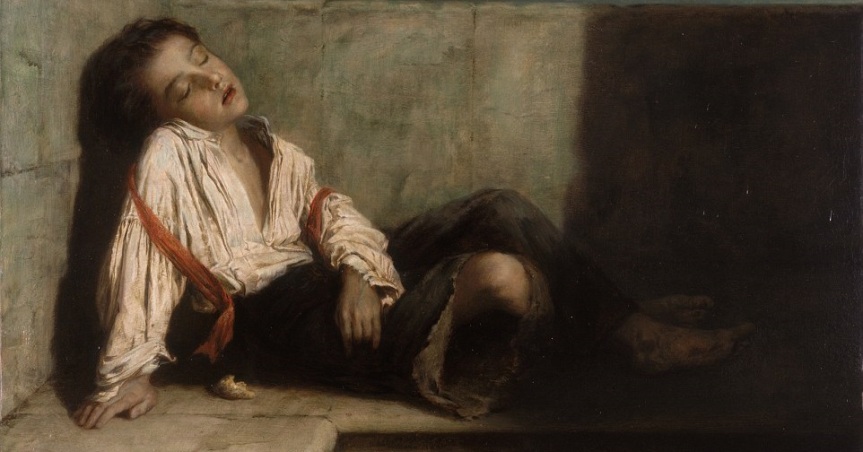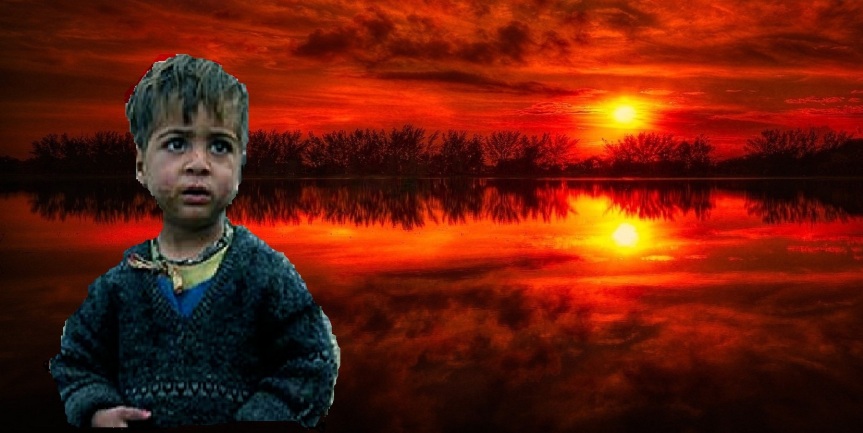When I think too much about something, it gets me dizzy. I feel good only I’m alone, sitting up here with my feet hanging over the chasm and watching the desolate landscape. The stone pit had many rocks, but now they are over. I gather how many saliva can, and from here on top spit on the last pile of broken stones that the truck has never come to take. If the spit falls on the pile, I hear it falling; if not, nothing is heard. Sometimes I cannot hit the pile because the wind blows.
Here I see the crowds of barracks, the cat on a roof, and on the right the garbage mountain. The dog has already started to bark. It always barks in the dusk, as if it mourns the sunset. Our barrack is the middle one. Dad always explains that it was the first one built here and that all the rest were then built around it. My father said about our barrack that it was the sitting hen.
The trucks came in the summer, drawing up the dust and shaking the mud in the winter. And out of stone came stone. Evryone was saying that. The stone recessed in the mountain was of three colors about death: gray, yellow an reddish.
Where the barking of the dog is heard, a cloud is approaching with its ragged edges as it was mad of feathers. I will never come back home. I’m going to spend my life here until the wind will wither me. There are grasses that live here at hight until the wind wither them, but there are some that the wind plucks and takes them.
When my mother died, I longed to go. At the time she was still alive, my father sometimes told me in the evening: “Go get fresh air”. And I went out and he locked the door. I stood for a moment without thinking of anything, and then wandering through the barracks. I loved hearing people talking inside and seeing the lights on the windows, which at night escaped my fear. I was going to the rubbish pile and looking for broken plates. And empty sardine boxes. The crocks I put with the top down on the ground and made them the alleys of the cemetery. The alleys did not get too straight, no matter how hard I did it.

The boxes of the sardines were the coffins of the deads: I filled them with water to half, caught ants and threw them in. I only started the cemetery with a box and slowly it ,became more and more broad.
After a while dad yelled for me. In winter I did not go out at all; it was too cold, everywhere there was mud, and I was standing by the door, but it seemed to stay inside: because of the creaks. When it rained, I took an old mantle, stretching it down, and I covered my head, sometimes the whole face, so I would not hear or see anything. One night a man who knew me passed and told me without stopping: “Are you kidding, boy ?”
My mother was called Matilde. When she was upset she was looking at me and bothering: “I don’t know why I gave birth to you !”. When my father was late and she had to warm up the dinner again, she was spending time saying there was no point in living.
We were holding a pair of rabbits in a cage near the barrack, in the side where there was no window. Because of the pestilence odor. The wire was rusty; two sticks were broken, that is, two feet of the cage, and dad had hardened them with a piece of wood tied with string to keep. In summer the rabbit stink penetrated inside. The rabbits we eat were cut by mother, and I had to help her. She punched them with the batler in their napes and after she had made them groggy, hanged them in a piron at the entrance and cuts their throat with a knife. While their blood was leaking, I kept the tureen. After that she was making a cut around their back paws and tooking them out of their skin, which turned back and was all wet and red. Then stretched it on the cage to dry. The flies gathered in black clusters on that white streaked with red veins when the skin was fresh.
One day, while mother was giving cabbage leaves to the rabbits, one escaped from the cage, damned, like a devil, she said. We found it only in the evening, near a barrack; the cat had killed it and left only half of it. Mother gave the other rabbit in exchange for a yellow hen with black feathers on the top of the wings.

The hen had the crest hanging all over one side, covering half its head. It had a wrinkled throat. It was living quietly in the cage of the rabbits, and at the time of laying it made one egg every day. I was going to take the egg as soon as the hen had cackled, and mother told me to put the egg over my eyes, as she said it kept the eyes sight. One day the egg had a softer peel that stuck it between my fingers and all the yolk and glair went down. Mother looked at the hen which was walking around inside the cage and said that it needed calcium. Every Sunday a woman from the neighbors brought us a bone of sepia, which looked like a white boat. The hen pecked it, but the eggs were still without peels. Finally we gave it crused eggshells and it was eating them, and it liked them a lot. The hen started again to lay eggs with shells, but now it was pecking its eggs because it used to eat shells. Dad sometimes stayed for ma moment in fron of the cage and said, looking at the hen: “It lives from the rent”.
When mother become sick and was only in bed, I could hear her from the corner where I was how she was groaning because of pain. Woman in neighbors said she had fever. And when she died, they said the fever was stronger than she was. Since then I had to cook, sweep the hut and bring water from the fountain. Dad was very depressed and did not speak. At night I heard him turn from one side to the other, until one day when he called out to me and said: “Come”. He made me sit beside him, and I was sleeping of the side of the hole that my mother had done in all years as she slept in that bed. I was struggling to sleep for two reasons: because I did not know how to sleep in bed, used to sleep on the floor, and because I was afraid of the hole and did not even dare breathe.
One night I started crying. After a while, dad woke up and wondered: “What are you doing ?” I did not dare to tell him that the hole was burning because of the mother’s hotness and it seemed to me that I was sleeping on her, suffocating her. And he said: “Or you end up crying or go out”. And I came out, that I was drowning in crying, and I slept on the ground under the open sky.

The very next day dad took the hen, distroyed the cage hitting it with the ax, and had dinner with the hen. Father was holding the hen on his knees and giving it bread crumbs, and the hen was eating them. Then he sent me to bring a bucket of water and gave it to drink: at every sip it stretched its throat up and he laughed. And sine that night dad has slept with the hen.
We made six bean nests. Three on each side of the door. Mother did this every year. On the wall near to the nail where she hung up the rabbits to cut them off there were more wires to hang the haulms. The beans began to grow: the haulms was pushed up the ground, from which remaind them a bit on the top, like a little hat. When their hat fell, the hen ate them. We put other grains and made a reed fence, which we brought it from the swamp. The hen looked at me while I was working. Sometimes it was approaching, and sometimes it stayed a little further, holding in the air a claw of lead color.
The cat which had killed the rabbit was the only cat around the barracks and it was half wild. No one gave it food to force it to hunt mice. It slept during the day on the roofs. One day I managed to catch the cat and locked it in the barrack together with the hen. The cat’s terribly caterwaul and the flaunders of the hen made you to thrill. When they were quiet, I opened the door: the cat came out quickly, and the hen dove upon me and dirtied me with the blood that squeezed out of its crest.
I’ve been trying to get rid of it, but I could not in any way. “Chick, chick !”, dad cried, still far away, when he came home from work. It was waiting for him, coming in together, and he gave it cabbage leaves which one of the laborers brought him.

Yesterday evening I was out in the air. The beans had grown and flourished. Father had put the hen on his shoulder and kept saying to it in a thin voice: “eat flowers, eat”. Then he sat down, told me to prepare dinner and that he wanted a salad with onions. We did not have onion at all, so I went to borrow one from the neighbor who gave us the bones of sepia. It had darkened, and could not breathe because of heat. I walked back, dragging my feet to make a path through the dust, and from time to time I stopped looking at the sky because I was disgusted with life.
The sky was different as usual, it seemed closer to the Earth and full of stars glimmering poorly. Before I turned to the barrack, I had heard dad’s voice sound like he was talking to someone. I stopped. I could not understand what he was saying. I approached a little more and stretched my throat. Father was holding the hen on his knees, stroking her back, and saying in a whisper: “Matilde, Matilde…” The hen was like a quit shadow…
I have lost my desire to come back home. I just want to be alone, not to think of anything, and spit.
Merce Rodoreda, Gallina


